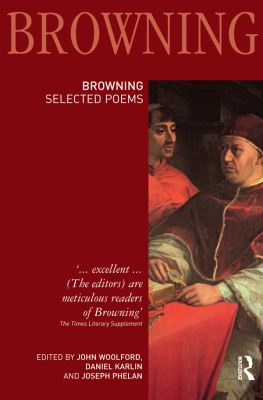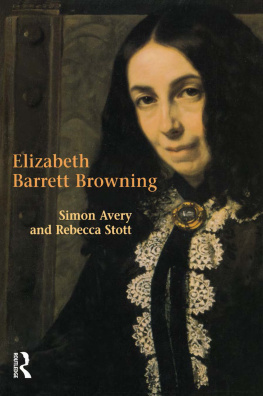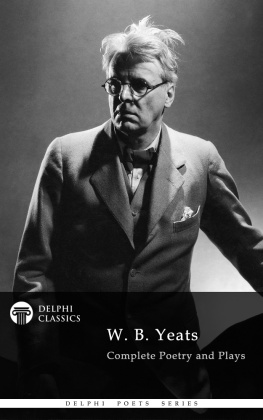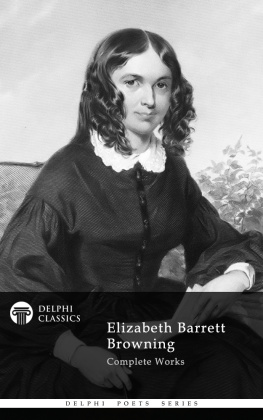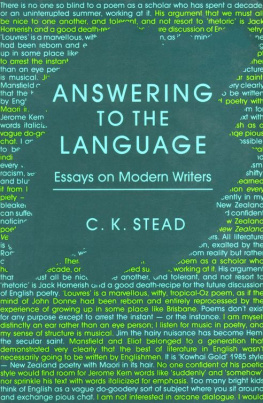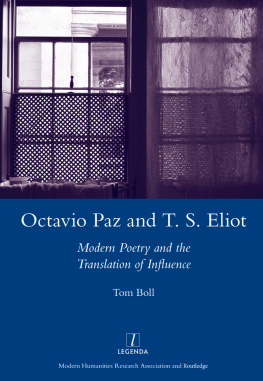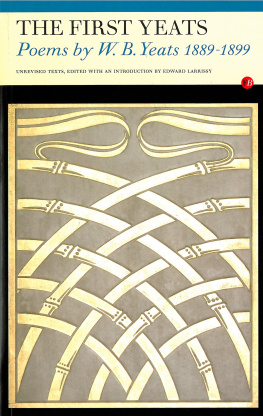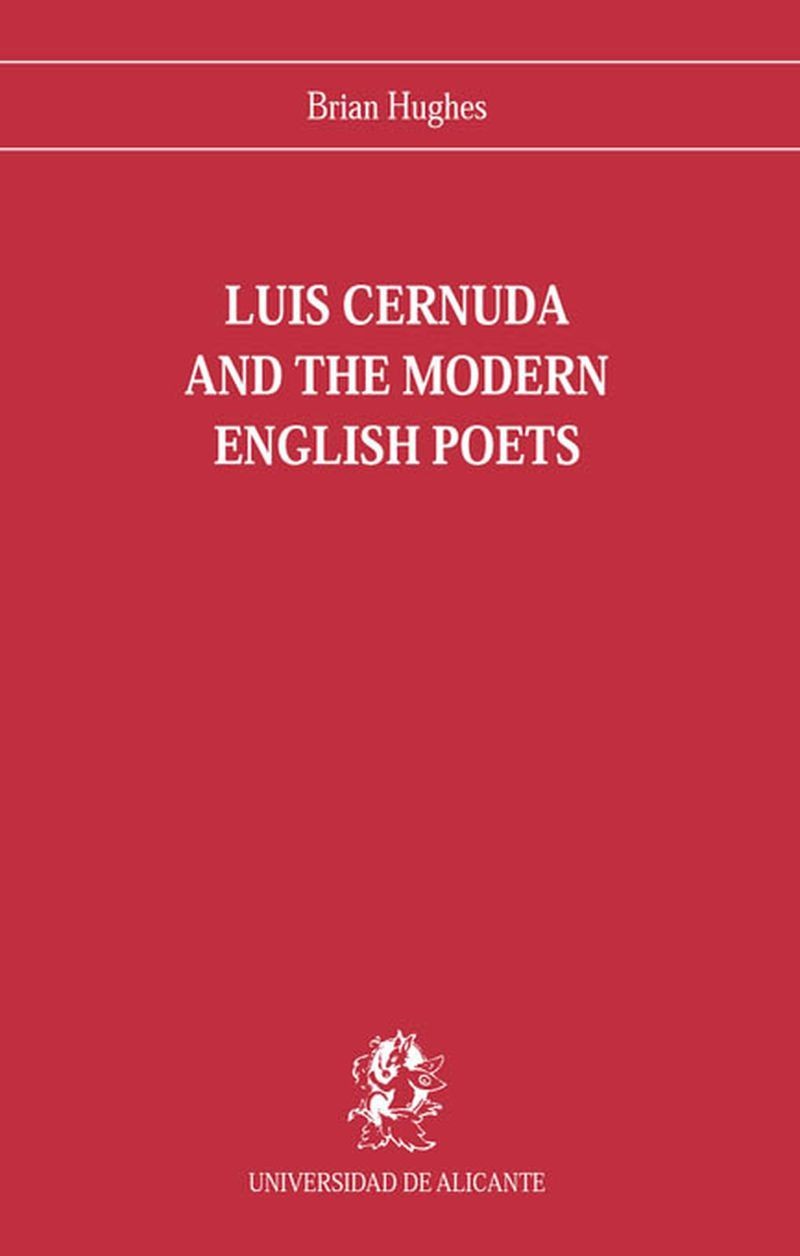
Luis Cernuda and the modern english poets
Though several generations of critics have reported finding English influences in the poetry of Luis Cernuda, no detailed or systematic study of the question has yet been undertaken. This book tackles the issue, concentrating on the traces in Cernudas work of three major English language poets: Robert Browning, W. B. Yeats and T. S. Eliot. Hughes takes us through a wide selection of the poetry Cernuda wrote in exile which he holds to be the best and most significant work in support of his argument that Cernudas conception of poetry underwent a radical reorganisation as a result of his absorption of certain of the techniques of his models. Brownings influence, it is argued, is noticeable chiefly in prosodic features and in the use of the persona, Yeatss is principally thematic, and Eliots is in some ways the most pervasive, since it affects Cernudas style and phrasing.
Edita:
Secretariado de Publicaciones. Universidad de Alicante
Diseo de portada:
Enrique. Gabinete de Diseo. Universidad de Alicante
Fotocomposicin:
COMPOBELL, S.A. Murcia
Impresin:
Hijos de E. MINUESA, S. L.
ISBN (Edicin digital): 978-84-9717-617-0
ISBN (Edicin impresa): 978-84-600-5148-0
Depsito Legal: M. 13.415-1988
Estos crditos pertenecen a la edicin impresa de la obra.
Introduction
No me queris, lo s, y que os molesta
Cuanto escribo. Os molesta? Os ofende.
Culpa ma tal vez o es de vosotros?
Porque no es la persona y su leyenda
Lo que ah, allegados a m, atrs os vuelve.
...........................................................................................................
Contra vosotros y esa vuestra ignorancia voluntaria,
Vivo an, s y puedo, si as quiero, defenderme.
Pero aguardis al da cuando ya no me encuentre
Aqu. Y entonces la ignorancia,
La indiferencia y el olvido, vuestras armas
De siempre, sobre m caern, como la piedra,
Cubrindome por fin, lo mismo que cubristeis
A otros que, superiores a m, esa ignorancia vuestra
Precipit en la nada, como al gran Aldana.
(A sus paisanos)
These lines, though not perhaps among his best, were written just over a year and a half before Cernuda died. The despondency brought on by age, exile and loneliness combines with the habitual acrimony and acerbity of his temperament to distort his view of his own public image; for, if his reputation was probably never as black as he persisted in painting it, it is now assured beyond question. Cernuda is generally held in discerning circles to be a great -perhaps the greatest- modern Spanish poet, an influence on, and, as Gil de Biedma puts it, an example to later generations. From Cernuda's poetry stems that of Valente, Gil de Biedma and Brines, and Ricardo Molina, Claudio Rodrguez and Luis Antonio de Villena would not have written as they do (or did) without his guidance, however unacknowledged. His line is, therefore, more influential than that of any of his contemporares, and when one considers that, among these contemporaries, Lorca, Aleixandre, Guilln and Alberti figured prominently, the achievement is indeed remarkable.
The reasons why Cernuda's poetry should command such high and such universal respect are -some of them- evident almost at first reading: the smoothness of line, the vibrant intimacy of tone, the delicacy and deliberateness of diction, and the fundamental honesty of thought (what he thought of as insobornabilidad); all are characteristic of Cernuda from the earliest poetry. But there is more. Cernuda strikes the reader as a poet restlessly intrigued by his experience, and also marvellously in control of it. Wanting the effervescence and brilliance of Lorca or Alberti, temperamentally unfitted for the serenity of Guilln or the joviality of Salinas, he made a virtue of necessity:
En ciertos poemas mos el verso queda como ensordecido bajo el dominio del ritmo de la frase. Desde temprano me agrad poco el verso de ritmo demasiado acusado, con su monotona inevitable ( ... ) Si en el verso hay msica, mi preferencia se orient hacia la msica callada del mismo ( ... ) Igual antipata tuve siempre al lenguaje suculento e inusitado, tratando siempre de usar, a mi intencin y propsito, es decir, con oportunidad y precisin, los vocablos de empleo diario: el lenguaje hablado y el tono coloquial hacia los cuales creo que tend siempre.
Of all his qualities, it is perhaps this last that most attracts the newcomer to his poetry. But this restraint was never softness: his growing mastery of his art conceals enormous subtlety, and there is perhaps more range in his mature poetry than in that of any other Spanish poet this century. There is a great deal of truth in his conviction that he had no need to learn modulation from the English poets: he was ready for the experience, predestined or predisposed, as he puts it.
For the present writer, as for Cernuda himself, this contact with English poetry was decisive:
Si no hubiese regresado, aprendiendo la lengua inglesa y, en lo posible, a conocer el pas, me faltara la experiencia ms considerable de mis aos maduros. Aprend mucho de la poesa inglesa, sin cuya lectura y estudio mis versos seran hoy otra cosa, no s si mejor o peor, pero sin duda otra cosa.
Cernuda rightly insists, on more than one occasion, that his own experience and his own tastes left him open to English influences, for he praises English poetry for the very qualities we have said he himself possessed:
Pronto hall en los poetas ingleses algunas caractersticas que me sedujeron: el efecto potico me pareci mucho ms hondo si la voz no gritaba ni declamaba, ni se extenda reiterndose, si era menos gruesa y ampulosa.
It is true, as the popular phrase has it, that you can't make a silk purse out of a sow's ear, and it is true generally -though, as we shall be trying to show, not in every case, and not precisely in the terms stated- that ese efecto de la lectura de los poetas ingleses acaso fuera ms bien uno cumulativo o de conjunto que el aislado o particular de tal poeta determinado. But one of the reasons why the reading and study of Cernuda's poetry is so pleasurable and rewarding to the English speaker is precisely the felt presence of English poets behind Cernuda's verses. My own particular interest in his poetry, apart from the obvious pleasure of reading him, arises from an accumulated awareness of these echoes, which frst pleased me, then intrigued me, and finally drove me to more precise enquiry. Having found confirmation, I sought a more exhaustive treatment of the issue, and hence the following essay. For, though all the critics of the last fifteen years or so -and some much earlier- have detected or reported English influences in Cernuda's poetry, there is as yet, as far as I know, no full-length study of the subject. The present essay is, therefore, an attempt, in the first place, to supply that; and it seems fitting that an English speaker should, as it were, return the compliment by taking an interest in Cernuda's interest in our poetry. Besides, it may be thought that the task is less laborious for an English speaker, who has the advantage of starting approximately from where Cernuda started.
I have stressed Cernuda's modernity, and it is for this reason that this study concentrates on only three modern English poets: Browning, Yeats and Eliot. The importance of their work for Cernuda has been acknowledged by his major critics -Paz, Harris, Gil de Biedma, Valente, Silver, Otero, Goytisolo, etc- but, though we shall be investigating their connection with Cernuda's poetry in depth, the reader should not take away the impression that these were the only important figures. They were not: but this essay sets out to show that they were the key poets in the osmotic process which effected the change in Cernuda from a post-Romantic of the Becquerian school into a consciously Modernist (not modernista) poet. I have, therefore, had to forgo, though with great reluctance, investigation of the importance of Shakespeare (especially the Sonnets), the Metaphysicals (Donne and Marvell in particular, though some reference to them is made), Wordsworth, Keats and Tennyson, all of whom, and others, it seems to me, played their part in shaping Cernuda's mature poetry. It is to he hoped that some day, someo ne will repair these weighty, but unavoidable, omissions.
Next page

